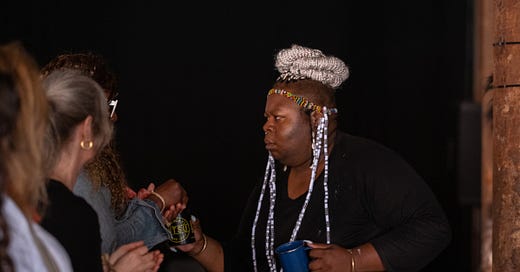The possibility of an explicit solicitation of informed consent. And yet.
On performance art, visibility, consent and care at this year's Liverpool Biennial.
By Jazmine Linklater.
'What are the protocols and limits that shape the narratives written as counter-history, an aspiration that isn't a prophylactic against the risks posed by reiterating violent speech and depicting again rituals of torture? How does one revisit the scene of subjection without replicating the grammar of violence?... Do the possibilities outweigh the dangers of looking (again)?' – Saidiya Hartman, ‘Venus in Two Acts’
This is a personal account of and reflection on an artwork. Just one. Despite the embarrassments of identification I can write this text only as myself. So to spite them: I am a thirty-one year old white woman from the north of England. I'm a tenant, an arts worker. These things are material. Are they relevant? I don't want you to assume.
Let's start on Regent Road. It's spotted with press day attendees, recognisable by our newly acquired Liverpool Biennial tote bags and orange programmes. We stop every few metres to photograph dilapidated buildings, sun-faded signage, developers' stamps on newly-power-washed and repointed warehouses. Dream Big. This is the old docklands where buddleia smother crumbling wooden quays. Where slave ships set sail to fill their bellies with people as cargo. To trade them. For profit. Dangerous Structure Keep Out.
At Tobacco Warehouse there's a queue. Let's join it. We're going to see the preview performance of 'The Black Circus of the Republic of Bantu' (2022) by Albert Ibokwe Khoza. Khoza describes themself as ‘a non-binary womanly man/manly woman with a divergent nature’. Artist, actor, dancer, they are also a practicing Sangoma – a traditional healer who, as I understand it, solicits the ancestors to guide, protect and help to heal the living. It would be arrogant of me to try to gloss this ancient and varied practice. But from my reading there are elements which will also appear in some form in the warehouse: dancing, chanting, communication in various languages (or tongues), (animal) sacrifice, connection to the ancestors for guidance. Let's bear this in mind. But watch out – the first person plural creates separation.
The Black Circus of the Republic of Bantu. My googling confuses me. I ask my Namibian friend about the term Bantu. In South Africa, where Khoza is from and my friend has lived, it seems almost a relic. A rejected derogatory term on the basis of its institutional history. The word comes from Abantu, the Xhosa and Zulu word for people, and was seemingly applied by colonists with a racist broad brush to all Black people they encountered. Its subsequent governmental use in the apartheid regime, like in the Bantu Education Act – a law of segregation and oppression – seems to have created the present-day rejection of its use except in relation to the language group, Bantu. These languages are spoken in their hundreds all over the continent. All over the globe. We might agree that all nation states are fictional countries, but especially those whose borders were drawn by colonisers. So many things can be true at once. Against that violence: people forcibly removed from their homeland want their country back. There's a gesture towards Pan-Africanism in this title that is a fuck you to colonial history and a fuck you to westerners' ignorance. Look at my ignorance. Let me assume that most western viewers have similar holes in their knowledge. Take this as both context and disclaimer.
The queue precedes the text. Presume more ignorance. I'm just trying to avoid eye contact. I've avoided gallery openings for months because they make me feel so anxious. But I wanted to see these performances so I'm here, keeping my head down. Feeling the beginnings of the delineation of the audience as a homogenous mass.
Festival staff move down the line carrying armfuls of brown rope. Are you comfortable for your hands to be bound? No – no – the person in front of me backs away, shaking their head. They almost bump into me. So this is to be participatory.



